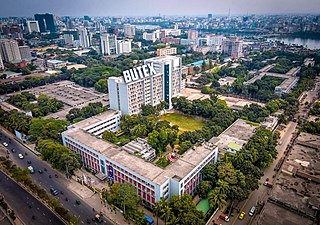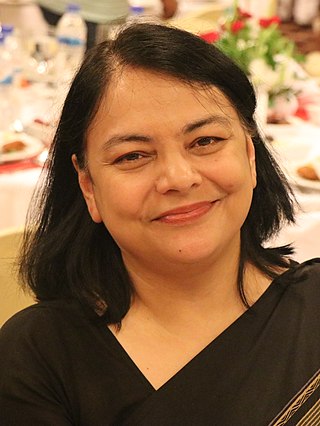Related Research Articles

Bangladesh, officially the People's Republic of Bangladesh, is a country in South Asia. It is the eighth most populous country in the world and is among the most densely populated countries, with a population of around 170 million in an area of 148,460 square kilometres (57,320 sq mi). Bangladesh shares land borders with India to the west, north, and east, and Myanmar to the southeast; to the south it has a coastline along the Bay of Bengal. It is narrowly separated from Bhutan and Nepal by the Siliguri Corridor; and from China by the Indian state of Sikkim in the north. Dhaka, the capital and largest city, is the nation's political, financial and cultural centre. Chittagong, the second-largest city, is the busiest port on the Bay of Bengal. The official language is Bengali.

The economy of Bangladesh is a major developing market economy. As the second-largest economy in South Asia, Bangladesh's economy is the 33rd largest in the world in nominal terms, and 25th largest by purchasing power parity. Bangladesh is seen by various financial institutions as one of the Next Eleven. It has been transitioning from being a frontier market into an emerging market. Bangladesh is a member of the South Asian Free Trade Area and the World Trade Organization. In fiscal year 2021–2022, Bangladesh registered a GDP growth rate of 7.2% after the global pandemic. Bangladesh is one of the fastest growing economies in the world.

The Institution of Civil Engineers (ICE) is an independent professional association for civil engineers and a charitable body in the United Kingdom. Based in London, ICE has over 92,000 members, of whom three-quarters are located in the UK, while the rest are located in more than 150 other countries. The ICE aims to support the civil engineering profession by offering professional qualification, promoting education, maintaining professional ethics, and liaising with industry, academia and government. Under its commercial arm, it delivers training, recruitment, publishing and contract services. As a professional body, ICE aims to support and promote professional learning, managing professional ethics and safeguarding the status of engineers, and representing the interests of the profession in dealings with government, etc. It sets standards for membership of the body; works with industry and academia to progress engineering standards and advises on education and training curricula.

The Border Security Force (BSF) is India's border guarding organisation at its borders with Pakistan and Bangladesh. It is one of the seven Central Armed Police Forces (CAPF) of India, and was raised in the wake of the Indo-Pakistani War of 1965 "for ensuring the security of the borders of India and for related matters".
Bangladesh Export Import Company Limited, commonly known by its trade name BEXIMCO, is a Bangladeshi multinational conglomerate holding company, headquartered in Dhaka, Bangladesh. It was founded in the early 1970s.

The Bangladesh Army is the land warfare branch and the largest component of the Bangladesh Armed Forces. The primary mission of the Army is to provide necessary forces and capabilities to deliver the Bangladeshi government's security and defence strategies and defending the nation's territorial integrity against external attack. Control of personnel and operations is administered by the Army Headquarters, Dhaka. The Bangladesh Army is also constitutionally obligated to assist the government and its civilian agencies during times of domestic national emergency. This additional role is commonly referred to as "aid to civil administration".

Khadi, derived from khaddar, is a hand-spun and woven natural fibre cloth promoted by Mahatma Gandhi as swadeshi (self-sufficiency) for the freedom struggle of the Indian subcontinent, and the term is used throughout India, Pakistan and Bangladesh. The first piece of the hand-woven cloth was manufactured in the Sabarmati Ashram during 1917–18. The coarseness of the cloth led Gandhi to call it khadi. The cloth is made from cotton, but it may also include silk or wool, which are all spun into yarn on a charkha. It is a versatile fabric that remains cool in summer and warm in winter. To improve its appearance, khadi is sometimes starched to give it a stiffer feel. It is widely accepted in various fashion circles.

Ahsanullah University of Science and Technology, commonly known as AUST, is a private University in Bangladesh. It was founded by the Dhaka Ahsania Mission in 1995.

The textile and clothing industries provide a single source of growth in Bangladesh's rapidly developing economy. Exports of textiles and garments are the principal source of foreign exchange earnings. By 2002 exports of textiles, clothing, and ready-made garments (RMG) accounted for 77% of Bangladesh's total merchandise exports. Emerging as the world's second-largest exporter of ready-made garment (RMG) products, Bangladesh significantly bolstered employment within the manufacturing sector.

Bangladesh University of Textiles, commonly referred to as BUTEX, is a public university in Bangladesh, situated in Tejgaon, Dhaka. It is the only public university in Bangladesh to teach textile engineering. The institution established education which sustains the entrepreneurship and industrialisation in the RMG industry of Bangladesh.
Textile schools in Bangladesh offer various academic and professional degrees in textile fields. A number of colleges and technical institutes as well as some universities offer diploma, bachelor's and master's degree from their allocated faculties upon completion of certification courses. Textile courses offered in these schools include spinning, weaving, knitting, dyeing, printing, finishing, apparels merchandising and fashion designing. As of 2019, textile material is the largest export item of Bangladesh. Bangladesh exported $42.35 billion worth of readymade garments in the 2018–2019 fiscal year.

The Institution of Engineers, Bangladesh, commonly referred to as IEB, is the national professional organisation of engineers in Bangladesh. It is registered under the Societies Registration Act (1860) of the country. Within the country, it has 18 centers and 31 sub-centers. It has 10 'overseas chapter' in different countries of the world, namely: Australia, Kuwait, Malaysia, Oman, Qatar, Saudi Arabia, Singapore, Thailand, United Arab Emirates and the United States. It formed the Board of Accreditation for Engineering and Technical Education (BAETE) which holds the accreditation of engineering faculties in Bangladesh.

The Economy of Chittagong is reflected in its gross state product of $116 billion in PPP terms ranking, second in size only behind Dhaka in Bangladesh. The nominal GDP of Chittagong metropolitan city is $43 billion. Chittagong metropolitan City is the second largest metropolitan city in Bangladesh. Chittagong is the export hub of Bangladesh, accounting for more than $38 billion in exports. Chittagong is the commercial hub of country.Chittagong is also home to the busiest port in the country.

The Rana Plaza collapse was a structural failure that occurred on 24 April 2013 in the Savar Upazila of Dhaka District, Bangladesh, where an eight-story commercial building called Rana Plaza collapsed. The search for the dead ended on 13 May 2013 with a death toll of 1,134. Approximately 2,500 injured people were rescued from the building. It is considered the deadliest accidental structural failure in modern human history, the deadliest garment-factory disaster in history and the deadliest industrial accident in the history of Bangladesh.
Clothing industry or garment industry summarizes the types of trade and industry along the production and value chain of clothing and garments, starting with the textile industry, embellishment using embroidery, via the fashion industry to apparel retailers up to trade with second-hand clothes and textile recycling. The producing sectors build upon a wealth of clothing technology some of which, like the loom, the cotton gin, and the sewing machine heralded industrialization not only of the previous textile manufacturing practices. Clothing industries are also known as allied industries, fashion industries, garment industries, or soft goods industries.

NASSA Group of Industries was founded in 1990 by Nazrul Islam Mazumder. It is one of Bangladesh's largest industrial conglomerate
Mohammad Fazlul Azim is a Bangladeshi industrialist, business magnate and former politician. He is the chairman of Azim Group, a leading industrial conglomerate and exporter in Bangladesh with business concerns in Garments, Steel, Engineering, Agro and various other sectors. He last served as an independent member of parliament of the Jatiya Sangsad. Azim was the only independent lawmaker in the parliament during the 9th Jatiya Sangsad. He also served in the parliament from the Bangladesh Nationalist Party.
The Bangladesh Knitwear Manufacturers and Exporters Association or BKMEA is a national trade organization of Knitwear manufacturers in Bangladesh and is located in Dhaka, Bangladesh. Member of Parliament Salim Osman is the president of the body. It is one of the main organisations which is expanding the ready-made garments industry of Bangladesh, and assisting the government and labour organisations to frame policy guidelines for this industry. Although there are some criticism related to the commitment of the members of this organisation to raise the labour and environmental conditions within this industry, it is almost impossible to sustainably grow this industry without this organisation's firm contribution and meaningful programs.

Fineotex Chemical Limited, is a speciality chemical-producing group with its headquarters in Mumbai, India. Fineotex is engaged in manufacturing of Speciality Performance Chemicals and Enzymes for Textile and Garment Industry, Water Treatment Industry, Leather Industry, Construction Industry, Paint Industry Agrochemicals, Adhesives and others. The plants of Fineotex are located in Navi Mumbai, Ambernath in India, and Selangor in Malaysia. The company has a global presence in approximately 70 countries, including Brazil, Bangladesh, Germany, Indonesia, Malaysia, Singapore, Syria, Thailand, the USA, Venezuela, and Vietnam.

Barrister Nihad Kabir is a Bangladeshi woman business magnate, lawyer and educator. She is well known for being one of the prominent women lawyers in Bangladesh. She is an advocate of the Supreme Court of Bangladesh who also served as the President of Metropolitan Chamber of Commerce and Industry, Dhaka from 2017 to 2022. In 2018, she was re-elected as the President of MCCI for 2019. In 2021, Nihad Kabir's name was revealed in the Pandora Papers leak as a beneficiary of some secret offshore entity.
References
- ↑ "Form industrial police to protect RMG sector — Textile engineers urge government". The Daily Star . Bangladesh. July 7, 2009. Retrieved September 19, 2019.
- 1 2 "Challenges of Bangladesh knit sector and the way out". Textile News, Apparel News, RMG News, Fashion Trends. April 29, 2018. Retrieved September 19, 2019.
- ↑ Staff Correspondent (May 21, 2018). "BSc engineers of four public colleges meet criteria for ITET membership". Textile Today. Retrieved September 19, 2019.
- ↑ "ITET launches new office". Textile News, Views & Articles. January 27, 2018. Retrieved September 18, 2019.
- ↑ Desk Report (January 29, 2018). "ITET opens its new headquarters". Textile Today. Retrieved September 19, 2019.
- ↑ "ITET gets new leadership". Textile Focus. June 19, 2017. Retrieved September 19, 2019.